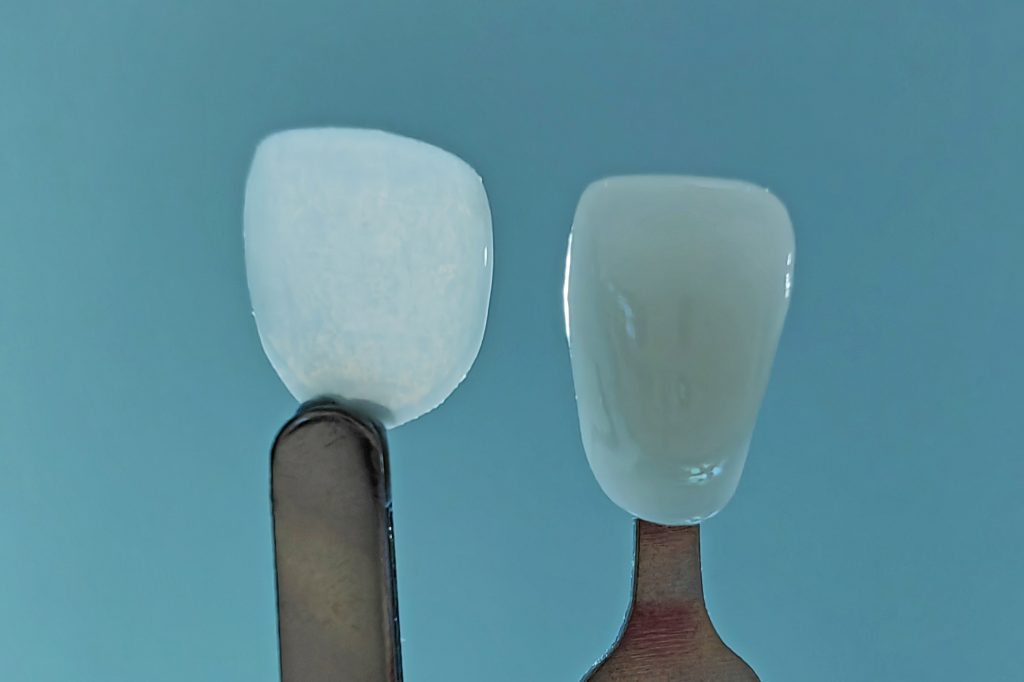Boston Micro Fabrication (BMF), a leader in advanced manufacturing solutions for ultra-high precision applications, announced it is entering the dental market with the launch of UltraThineer, the world’s thinnest cosmetic dental veneer. The new 3D-printed veneers use projection micro stereolithography (PµSL), a technology that custom-manufactures veneers that are three-times thinner than traditional veneers and require significantly less preparation for dental professionals, allowing preservation of the patient’s enamel with less reduction.

UltraThinner (left) next to a conventional veneer (right). (Photo: Business Wire)
UltraThineer veneers are expected to be available in the U.S. in the spring of 2024, following review by the U.S. Food and Drug Administration (FDA).
BMF is committed to developing applications where its unique, micro-scale, highly precise printing technology can significantly reduce production time and cost as well as enable innovation. UltraThineer veneers, which have been developed in collaboration with Peking University, feature advanced material, a production workflow, and the finishing process to deliver thinner, more comfortable, and less invasive veneers. Additive manufacturing, or 3D printing, is already proven across multiple dental applications including orthodontic aligners, mouthguards, drill guides, and dentures due to need for on-demand, personalized, and custom solutions.
“The ability to print ceramics at minimal thickness will be revolutionary. Our current processes for producing minimal prep veneers can be labor-intensive when compared to milled, full coverage crowns in zirconia. Conservative reduction of the patient’s enamel should be practiced whenever possible. I’m looking forward to the start of this new technology, allowing intricate, ultra-thin veneers to be printed. BMF’s advancements and innovation will continue to push the boundaries of dentistry and inspire innovation worldwide,” stated Jessica Love from Capture Dental Arts, a leading US provider of cosmetic dental service.
Currently, veneers are manufactured to a thickness of approximately 0.5 mm or more and require extreme prep work of existing teeth. This is a highly invasive, non-reversable, and uncomfortable procedure for the patient. For aesthetic restoration, ultra-thin veneers allow little to no tooth preparation, preserving as much enamel as possible and are just 100 µm thick. With a choice of ultra-thin zirconia veneers, dentists can align, reshape, or brighten teeth with a simple, painless, and minimally invasive procedure.
“The ultra-thin and strong 3D printed zirconia veneer technology can quickly and painlessly strengthen and protect the surface of teeth, prevent cold acid stimulation and wear, and significantly improve appearance. More importantly, compared to conventional ceramic veneer technology, the entire process of tooth reduction is eliminated,” said professor Sun Yuchun, Peking University School of Stomatology.
In addition to providing machines, materials, and software to industries looking to prototype and produce high precision parts, BMF has been developing and incubating end-use applications that can be uniquely enabled by the PµSL process.
“Using our unique technology, companies across industries, from electronics to medical devices, are keeping pace with the increasing miniaturization of technology. In addition to continuing to partner with our customers on their own innovations, we’re excited to unveil one of the first self-developed applications of our technology,” stated John Kawola, CEO-Global, BMF. “We know that patients and dentists alike can benefit from thinner veneers and are looking forward to bringing higher levels of precision to the cosmetic dental industry.”
For more information, please visit www.ultrathineer.com.
About Boston Micro Fabrication
Boston Micro Fabrication (BMF) enables highly precise, micro-scale 3D printing across healthcare, the life sciences, electronics, and machining industries. Using the company’s proprietary PμSL (Projection Micro Stereolithography) technology, the microArch system printers produce the industry’s most accurate and precise high-resolution 3D prints for product development, research, and industrial short run production. Founded in 2016, BMF has offices in Boston, Shenzhen, Chongqing and Tokyo with a research and development center in San Diego.
For more information on BMF, please visit www.bmf3d.com or follow the company on LinkedIn.












